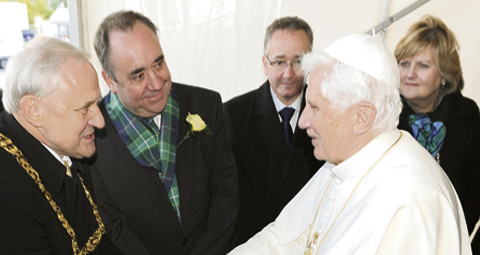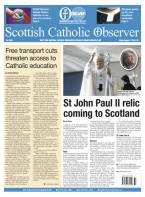July 6 | ![]() 0 COMMENTS
0 COMMENTS ![]() print
print

The new Scotland and old traditions
— Ahead of the referendum, the next two years will be crucial for the future of Christianity in this country, say DAVID KERR
I write as I return to Rome after a late night of celebrations in Siena. For the first time in 17 years the Onda district has won the Italian city’s world-famous Palio horse race. Three laps around the main civic square, the Campo, produced another moment of glory for 13 times winning jockey Luigi Bruschelli. It also further assures him a permanent place in the saga of this inter-neighbourhood equine contest which still bears all the character and colour of its Renaissance roots.
As the victorious blue and white flags of Onda flooded onto the racetrack, a tidal wave of relief and rejoicing swept through the narrow streets; elderly women wept and embraced each other, portly middle-aged men did the same while children danced in the knowledge that victory for their neighbourhood was no longer the preserve of parental legend. All made their way to the church of Santa Maria di Provenzano where they gathered to collectively sing, nay holler, a thanksgiving Ave Maria.
Such is the way with all tradition. It is that irreplaceable inter-generational inheritance of practical experience rooted in abstract wisdom or, as GK Chesterton coined it, the ‘democracy of the dead.’ Tradition helps us to shape our future by being mindful of our past without being hidebound by it.
I was therefore struck by a recent television interview with the former leader of the Canadian Liberal Party, Michael Ignatieff, who I actually met many years ago while a student at St Andrews University.
Given his experience of Canadian constitutional politics Ignatieff firmly predicted that, whatever the result of 2014’s independence referendum, ‘a new Scotland’ will be born.
If that is in anyway true—and I would suggest that it is—the next two years will therefore be particularly crucial for the future of Christianity in this country.
A cursory glance at the history books reveals that the narrative a nation tells about itself at moments of formative change casts a long, long shadow over its future. St Thomas Aquinas had it right when he observed how entities tend to continue in the manner by which they were created.
Meanwhile, those who lead that change often become touchstone figures for all future decision-making. Just think of how totemic the Founding Fathers are to the United States or Gandhi to India or Jinnah to Pakistan. The list goes on. So what narrative are we Scots telling ourselves as we approach 2014?
There are those supporting a ‘Yes’vote who would subscribe to that infamous Diderot-inspired maxim of academic Tom Nairn: “Scotland will be free when the last minister is strangled by the last copy of the Sunday Post.”
At the same time the leaders of three main unionist parties leading the ‘No’ campaign—Johann Lamont, Ruth Davidson and Willie Rennie— also seem keen to hasten the setting of the sun on ‘Sunday Post Scotland’ as betokened by their recent high-profile, collective endorsement of same-sex ‘marriage.’
For many on both sides of the constitutional debate their ‘new Scotland’ seems to involve the shedding of old traditions including orthodox forms of Christianity. Make no mistake. Whatever future we choose in 2014, times could get pretty tough for Christians.
When Pope Benedict XVI visited this country on September 16, 2010 he was welcomed by a grand St Ninian’s Day Parade celebrating over 1600 years of Christianity in Scotland.
More than 125,000 people cheered as a litany of historic Christian figures made their way down Princes Street; from St Margaret, St Columba and St Ninian himself down to the Reverend George MacLeod, Sir Alexander Fleming and Eric Liddell.
In a country where two-thirds of people still identify themselves as Christian, it was a very public celebration of the overwhelmingly positive contribution that Christianity has made to Scottish society.
Indeed, as the First Minister Alex Salmond said at the time ‘without the Church, there would have been no Scotland as a country in its own right.’
Christians claim no special rights within contemporary Scotland. Our proposition that Jesus Christ is true God and true man is rooted in both faith and reason. We seek to give a measured explanation for the hope that is within us. We aspire to establish a culture of life and civilisation of love. We are keen to cooperate with others in the promotion of the common good.
All we request in return is respect for our right to play a constructive part in the creation of our ‘new Scotland’ whether it becomes independent or remains part of the United Kingdom.
“There are some who now seek to exclude religious belief from public discourse, to privatise it or even to paint it as a threat to equality and liberty,” Pope Benedict observed in his Glasgow homily two years ago.
“Yet religion is in fact a guarantee of authentic liberty and respect, leading us to look upon every person as a brother or sister.”
He called upon Scottish Christians to provide ‘clear voices which propose our right to live, not in a jungle of self-destructive and arbitrary freedoms’ but in ‘a society which works for the true welfare of its citizens and offers them guidance and protection in the face of their weakness and fragility.’
“Do not be afraid to take up this service to your brothers and sisters, and to the future of your beloved nation,” he concluded.
Regardless of how you are minded to vote in 2014, the time to take up that challenge is now. Get involved. Your country needs you.
— David Kerr is the Rome correspondent for a US-based news agency. He is also a former SNP parliamentary candidate
Pic: Paul McSherry











